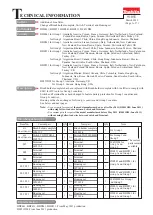
22
or, if DHCP times out (30 seconds), via Auto-IP. In the very unlikely event that an Auto-IP address
cannot be found a static IP address of 192.168.0.100 is assigned. Resetting the LAN removes any
password protection.
For more information on LXI standards refer to www.lxistandard.org/home .
LAN Connection
To use the LAN interface, the IP address of the unit must be known. There is a LXI Discovery Tool
on the supplied CD-ROM which can be used to display the IP addresses (and other associated
information) of all connected devices that comply with the VXI-11 discovery protocol. This tool is a
Windows PC application that should be installed and run on the controlling PC with the unit either
connected directly to the PC network connector or via a router. Connecting via a router is
recommended as this is significantly quicker to assign an IP address; connecting directly to the PC
will begin to assign an IP address only after a 30 second DHCP timeout. Double clicking on any
entry in the list of devices discovered will open the PC's web browser and display the Home page
of that device.
There are also tools for LAN discovery included as part of the National Instruments Measurement
and Automation Explorer package and the Agilent Vee application.
The unit will, when first powered up, attempt to obtain settings via DHCP if available or, if DHCP
times out (30 seconds), via Auto-IP. In the very unlikely event that an Auto-IP address cannot be
found a static IP address of 192.168.0.100 is assigned. During this time the LAN lamp will be lit
and it will stay lit if a LAN connection is successfully made. However, if a connection is still not
made by the end of the above process, or if the LAN connector is physically removed at any time,
the LAN lamp will go off; see LAN Error section for details.
Web Server; Configuration Password Protection
The unit contains a basic web server. This provides information on the instrument and allows it to
be configured. The Configure page can be password protected to deter unauthorised changes to
the remote operation configuration; the default configuration is ‘no password’.
The Configure page itself explains how to set the password. The password can be up to 15
characters long; note that the
User Name should be left blank
. The password will, however, be
reset to the default (no password) if the rear panel LAN RESET switch is used to reset all the LAN
parameters to their factory default.
The web pages also have an ‘Identify’ function which allows the user to send an identifying
command to the instrument which causes its displays to flash until the command is cancelled.
ICMP Ping Server
The unit contains an ICMP server allowing the instrument to be ‘pinged’ via either its host name or
IP address.
VXI-11 Discovery Protocol
The instrument has very limited support of VXI-11 which is sufficient for the discovery protocol and
no more.
The instrument implements a Sun RPC Port-mapper on TCP port 111 and UDP port 111 as
defined in RPC1183. The calls supported are: NULL, GET PORT and DUMP.
On TCP port 1024 a very simple VXI-11 protocol is implemented sufficient only for instrument
discovery. This implements the following calls: CREATE LINK, DEVICE_WRITE, DEVICE_READ
and DESTROY_LINK.
Once a link has been created anything written to the device is ignored and any read from the
device returns the identification string as would be expected from a “*IDN?” of the form
‘Manufacturer,Model,Serial No.,X.xx – Y.yy’
for example
THURLBY THANDAR,CPX400SP,279730,1.00 – 1.00
where ‘X.xx’ is the revision of the main firmware and ‘Y.yy’ is the revision of the interface firmware.
Interface firmware is user field updateable via the USB port.
Summary of Contents for CPX400S
Page 1: ...CPX400S SA SP PowerFlex DC Power Supply ...
Page 28: ...27 Status Model ...
Page 36: ......














































